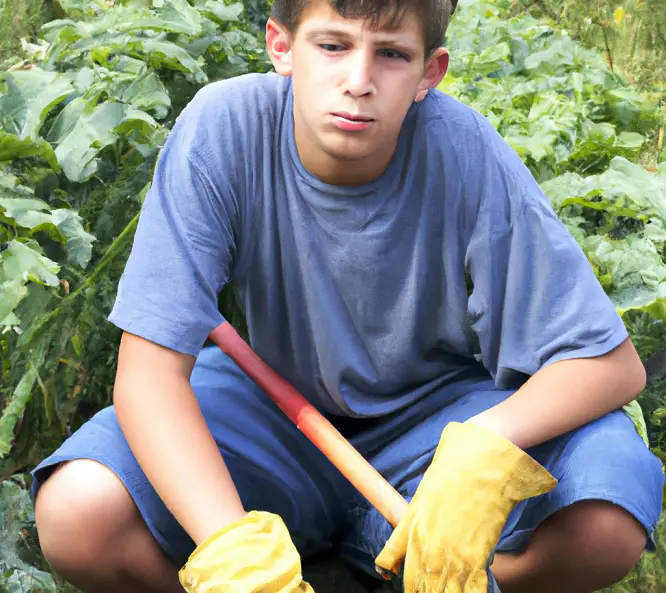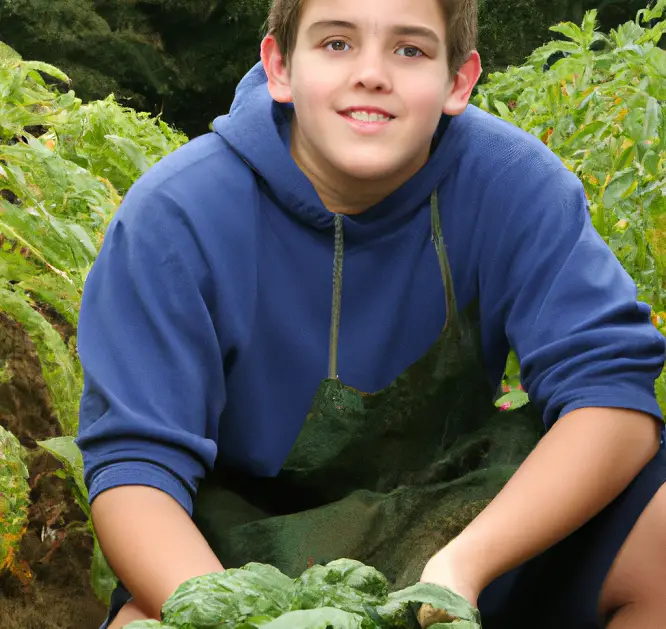Becoming a teenage crop picker can be a great way for young people to earn some extra money and gain valuable work experience. Crop picking involves harvesting fruits, vegetables, or other crops, and it is a physically demanding job that requires attention to detail and hard work.
To become a teenage crop picker, you may need to look for opportunities in your local area. Some farms or orchards may hire teenagers during harvest season, and you can often find job listings through online job boards, local classified ads, or by contacting the farm directly.
While no specific qualifications are required to become a crop picker, you will need to be able to work long hours in sometimes challenging weather conditions. You may also need to provide your own transportation to the job site.

Why You should choose Crop Picker on Teenage?
Choosing to work as a crop picker during your teenage years can offer a number of benefits. Firstly, it can be an excellent way to earn some extra money and gain valuable work experience. Crop picking jobs often pay hourly wages or by the amount of produce picked, so you have the potential to earn a good income over a relatively short period of time.
In addition to the financial benefits, crop picking can also be a physically demanding job that provides an opportunity to get exercise and fresh air. It can be a great way to stay active and improve your overall health and fitness.
Crop picking can also be a great opportunity to learn about agriculture and gain an appreciation for where our food comes from. You will have the opportunity to work with farmers and other agricultural professionals and learn about the process of growing and harvesting crops. This knowledge can be useful in future careers or even in your personal life.
Steps to Becoming a Successful Crop Picker for Teens
Becoming a successful crop picker as a teenager requires more than just physical endurance and a willingness to work hard. Here are some additional steps you can take to maximize your success in this role:
- Understand the job requirements: Before you start working as a crop picker, make sure you understand what the job entails. Ask your supervisor or co-workers to explain the duties and expectations for the role, including how to handle the crops properly and how to work efficiently.
-
Develop good communication skills: Good communication skills are important in any job, including crop picking. Be willing to ask questions, listen to instructions, and communicate effectively with your co-workers and supervisor.
-
Build strong relationships: Developing strong relationships with your co-workers and supervisor can help you succeed in your role. Be respectful, friendly, and willing to help out when needed.
-
Be reliable: Reliability is a key factor in any job. Make sure you show up on time, work consistently throughout your shift, and follow through on your commitments.
-
Stay organized: Crop picking can involve a lot of physical movement and repetitive tasks. Staying organized can help you work more efficiently and avoid mistakes. Keep track of your tools and equipment, and stay focused on the task at hand.
-
Develop problem-solving skills: Crop picking can involve unexpected challenges, such as weather changes or crop damage. Developing good problem-solving skills can help you overcome these obstacles and succeed in your role.
-
Learn new skills: As you gain experience as a crop picker, look for opportunities to learn new skills or take on additional responsibilities. This can help you grow in your role and prepare for future career opportunities.
Teenage Crop Picker salary
The salary for a teenage crop picker can vary depending on a number of factors, including the location of the farm, the type of crop being harvested, and the specific job duties required. In general, crop picking jobs typically pay hourly wages or by the amount of produce picked, with hourly wages ranging from minimum wage to around $15 per hour or more.
According to the United States Department of Labor, the median hourly wage for farmworkers and laborers involved in crop, nursery, and greenhouse work was $14.72 in May 2020. However, it’s important to note that this includes workers of all ages and experience levels, so the actual pay for teenage crop pickers may be lower.
Some farms may offer other forms of compensation, such as free or discounted housing or access to fresh produce, in addition to hourly wages. It’s important to research the specific farm or orchard where you plan to work to understand the expected pay rate and any additional benefits that may be available.
Duty Of a Teenage Crop Picker
The duties of a teenage crop picker can vary depending on the type of crop being harvested and the specific needs of the farm or orchard. However, some common duties of a teenage crop picker may include:
- Harvesting crops: The primary duty of a crop picker is to harvest crops, which involves picking fruits, vegetables, or other produce according to specific standards set by the farm.
- Sorting and grading: After the crops are harvested, crop pickers may be responsible for sorting and grading the produce to ensure that it meets the quality standards set by the farm or buyer.
- Packaging and loading: Once the produce is sorted and graded, crop pickers may be responsible for packaging it in containers or crates and loading it onto trucks or other vehicles for transport.
- Maintaining equipment: Crop pickers may also be responsible for maintaining and cleaning the equipment used in the harvesting process, such as baskets, ladders, or shears.
- Following safety protocols: Crop pickers must follow safety protocols to ensure their own safety and the safety of others, such as wearing protective gear, using tools and equipment properly, and following instructions from supervisors.
How to Become a Teenage Lifeguard
Tips & Tricks for Succeeding as a Teenage Crop Picker
Succeeding as a teenage crop picker can be challenging, but there are some tips and tricks that can help you excel in this role. Here are some suggestions:
-
Dress appropriately: Crop picking can be physically demanding work, so wearing comfortable and appropriate clothing is important. Choose clothes that are lightweight, breathable, and allow you to move freely.
-
Stay hydrated: Working in the field can be hot and exhausting, so it’s important to stay hydrated. Bring a water bottle with you and take frequent breaks to drink water.
-
Use sunscreen: Protect your skin from the sun’s harmful rays by wearing sunscreen with at least SPF 30. Reapply every two hours or as needed.
-
Use proper lifting techniques: When lifting heavy objects, such as buckets of crops, use proper lifting techniques to avoid injury. Bend your knees and lift with your legs, not your back.
-
Take care of your hands: Your hands are essential tools in crop picking, so it’s important to take care of them. Wear gloves to protect your hands from cuts and blisters, and use hand lotion to keep them moisturized.
-
Stay focused: Crop picking can be repetitive work, but it’s important to stay focused on the task at hand. Avoid distractions and stay alert to avoid mistakes or accidents.
-
Build a positive attitude: A positive attitude can go a long way in any job. Approach your work with enthusiasm and a willingness to learn and improve.
-
Respect the crops: Crops are a valuable resource and it’s important to handle them with care. Follow the proper procedures for picking and handling crops to avoid damaging them.
Pros and Cons of Teenage Crop Picker
Pros of Teenage Crop Picker:
-
Gain valuable work experience: Working as a crop picker during your teenage years can provide you with valuable work experience and teach you important skills such as teamwork, attention to detail, and time management.
-
Earn money: Crop picking jobs can be a good way to earn some extra money during the harvest season, and can also help you save for future expenses or goals.
-
Learn about agriculture: Working as a crop picker can provide you with an opportunity to learn about agriculture and gain an appreciation for where our food comes from. You will have the opportunity to work with farmers and other agricultural professionals and learn about the process of growing and harvesting crops.
-
Physical activity: Crop picking can be a physically demanding job that can help you stay active and improve your overall health and fitness.
Cons of Teenage Crop Picker:
-
Physically demanding: Crop picking jobs can be physically demanding and require long hours of standing, bending, and lifting. This can be challenging for some teenagers, especially those with health issues or physical limitations.
-
Weather conditions: Crop picking jobs are often performed outdoors, which means that you may have to work in extreme weather conditions, such as heat, cold, or rain.
-
Seasonal work: Crop picking jobs are typically only available during the harvest season, which means that they may not be a reliable source of year-round employment.
-
Limited career prospects: While working as a crop picker can provide valuable work experience, it may not offer many opportunities for career advancement or long-term employment.
Frequently Asked Questions
What age can you start working as a teenage crop picker?
The minimum age to work as a crop picker can vary depending on the laws and regulations of your state or country. In the United States, for example, you generally need to be at least 14 years old to work in most non-agricultural jobs, but there are exemptions for agricultural work. However, it’s important to check with your local labor department or employment agency to understand the specific laws and regulations in your area.
What type of training is required to become a teenage crop picker?
No formal training is required to become a teenage crop picker, but some farms may provide on-the-job training or orientation sessions to teach you about the specific crop and harvesting techniques. You may also be required to follow specific safety protocols, such as wearing protective gear or using tools and equipment properly.
How much can you expect to earn as a teenage crop picker?
The pay for teenage crop pickers can vary depending on the location, type of crop, and specific job duties required. In general, crop picking jobs typically pay hourly wages or by the amount of produce picked, with hourly wages ranging from minimum wage to around $15 per hour or more. Some farms may offer other forms of compensation, such as free or discounted housing or access to fresh produce, in addition to hourly wages.
Is working as a teenage crop picker safe?
Working as a crop picker can involve physical labor and exposure to outdoor elements, which can pose some safety risks. However, farms are required to follow specific safety protocols to protect their workers, such as providing protective gear, training on the safe use of tools and equipment, and implementing emergency procedures in case of accidents or injuries.
Can working as a teenage crop picker lead to a long-term career in agriculture?
While working as a crop picker can provide valuable work experience and knowledge about agriculture, it may not offer many opportunities for long-term career advancement or stable employment. However, it can be a great starting point to gain experience and explore potential career paths in agriculture or related fields.
Final Summary
To become a teenage crop picker, it’s important to check the legal requirements in your area, research job opportunities, build your physical stamina, obtain necessary certifications, prepare your resume, and apply for jobs. To be successful in this role, it’s important to understand the job requirements, develop good communication skills, build strong relationships, be reliable and organized, develop problem-solving skills, and learn new skills.
